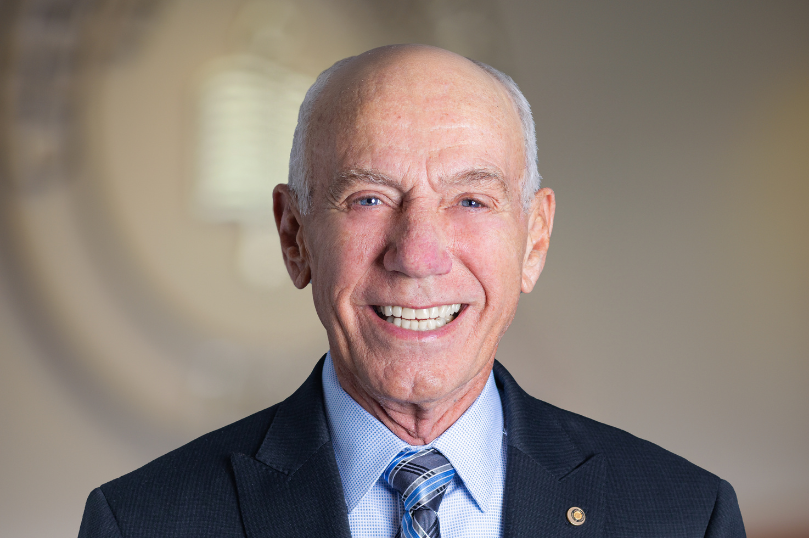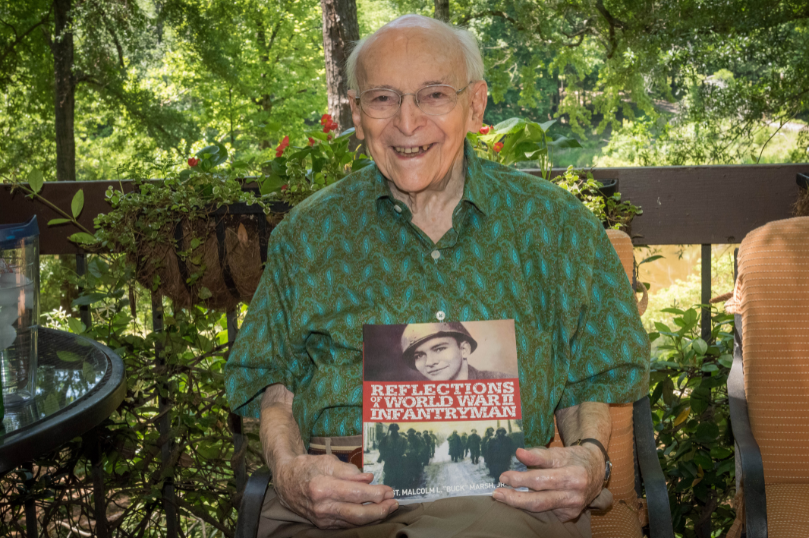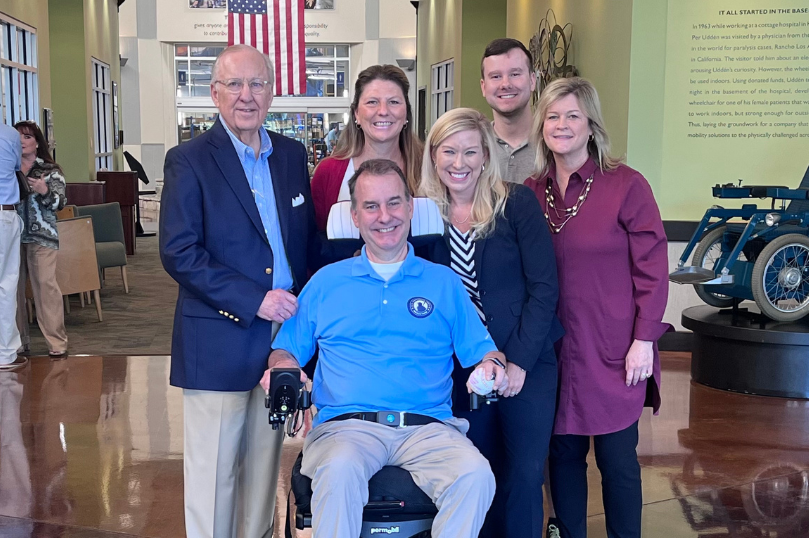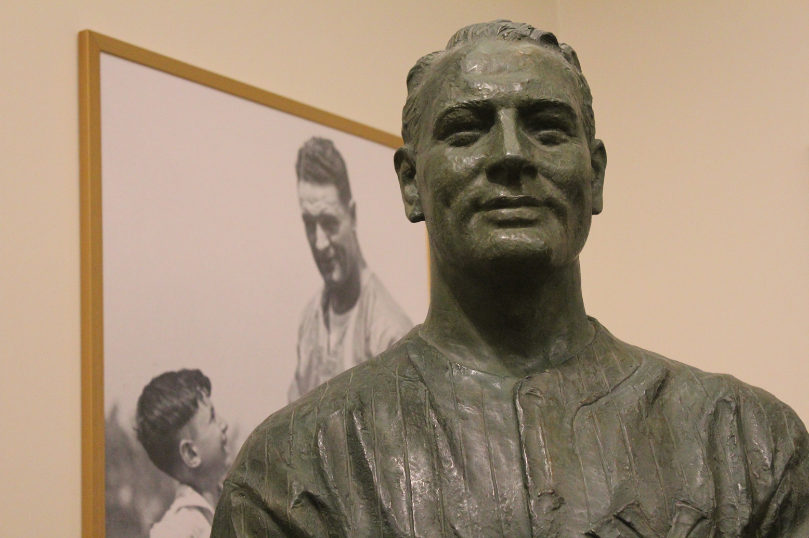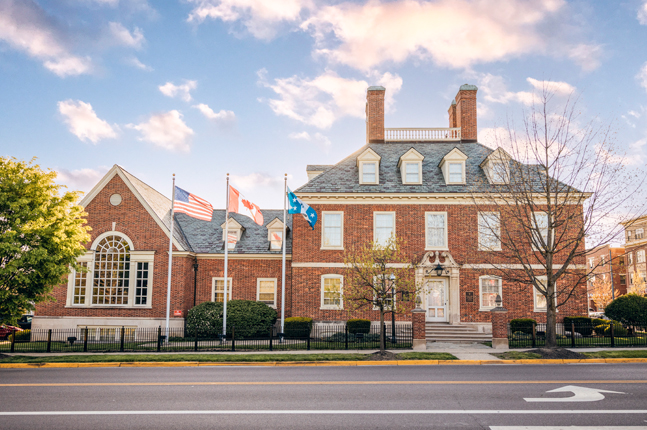Investing in the Future
Jim Burra’s, CSUN ’67, service to the Fraternity is extensive. In addition to serving as Omicron South province president from 1986 to 1992, he served on the Foundation Board of Trustees from 1999 to 2007 and finally as a chapter advisory chair from 2013 to 2016. In great appreciation of his dedication, the Fraternity awarded Jim the Legion of Merit at the 77th General Convention in Paradise Valley, Arizona, in 2008 and the 2019 Raymond L. Gardner Alumnus of the Year Award. In addition to being a platinum-level Trustees Roundtable donor, he was an early lead Campaign 2030 donor.
Jim spent thirty years building his company Endural into a significant supplier of reusable and recyclable products. In 2021, as president of Endural, he retired and sold the company. Endural manufactures a proprietary line of plastic boxes for the automotive, electronics, and aerospace industries. In 2021, Jim also retired from the board of directors of Semtech Corp., a producer of analog and mixed-signal semiconductors. Prior to his entrepreneurial ventures, Jim was the chief financial officer of Intercole, Inc., a public company that manufactured a variety of industrial products.
Jim joined the Chapman Board of Governors in 1998 and the Board of Trustees in 2011. He served as the chairman of the endowment investment committee for nine years. Chapman’s endowment grew from $301 million to more than $850 million during that time. Jim and his wife Kay established the chair of Executive Professor of Accounting. They funded the new Burra School of Accounting and Finance within the Argyros College of Business and Economics. They both understand the power of a good education and enjoy seeing young students take advantage of the opportunities offered at Chapman.
Jim and Kay have been married for over sixty years. They are the proud parents of Lisa and Laura. Laura is a graduate of Chapman. Both daughters have three children. All six grandchildren are a joy to Grammy and Grandpa.
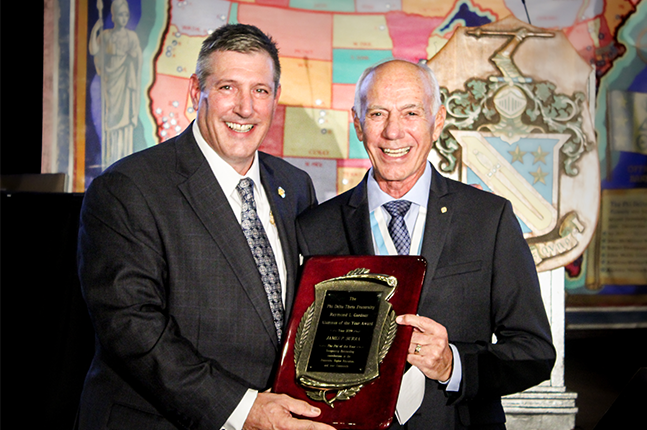
Do you have any favorite memories of your time in California Zeta at CSUN?
When I arrived in 1964, Cal State University Northridge was a new campus in the CSU system. It was a commuter school with only a few dorm rooms. I drove to campus with some friends to save gas money and worked part-time to support myself.
Fraternities were just forming. They were local fraternities with the thought of joining a national fraternity in the future. My friend and co-commuter Bruce (later Dr. Bruce Kautz) saw an announcement about the formation of a new fraternity. We went to the organization meeting and met a great group of guys. They asked us to join, and we did.
Phi Sigma Tau was a group of young and inexperienced guys, but we thought we knew it all. We applied to the school and became the fourth fraternity on campus. Social activities were our main concern. Bruce and I made many new friends, which, as commuters, helped us connect with our school. As we grew, charitable activities became a part of our little group. Mixers with sororities helped us meet young ladies. We also joined in interfraternity activities. Life was good. During that time, I met a sorority girl named Kay Krook. Fast forward, we have now been married for over sixty years.
Our fraternity brother, Chris Job’s, ’67, father, Richard Job, Case Western Reserve ’44, was a member of Phi Delta Theta. With his encouragement, we petitioned Phi Delta Theta to become California Zeta. It was an extensive process and required all of us to work hard for acceptance. We were the first Cal State University campus to apply to an international fraternity and we had the help of the then-General Council president of Phi Delta Theta, Stan Brown, Nebraska ’36.
The best part of undergraduate life was working with my brothers, many of whom continue as friends. I am proud to say that they have been a successful bunch. They have made contributions to their communities in a variety of ways. The aforementioned Bruce became Dr. Bruce Kautz, ’67, a dentist who practiced for over forty years. Dr. Tom Garnella, ’64, was a school district superintendent. Dr. Bob Bailey ’64, was a geologist for the US Forest Service and wrote three books on ecology. His books are in the Banta Library in Oxford. Leonard Gelfand, ’67, became the president of Farmers Insurance. Chris Lapple, ’80, became General Council president of Phi Delta Theta. We all learned from each other. That’s a brotherhood.
Along the way, I decided to get involved with the CSUN Interfraternity Council so that our chapter could be represented. I served as an officer and then as president. It was an exceptional experience.
No, I was never a pledge and missed the opportunity to bond with pledge brothers. However, I believe the experience of starting our local fraternity and then applying to Phi Delta Theta was a big part of my college education.
Talk about your time as a Phi Delta Theta Foundation Trustee and Chapman Board of Trustees.
Cal State Northridge was a new campus with no housing when I arrived in 1960. Our chapter rented a series of neighborhood houses which we fashioned into places to meet and live. After graduation, I worked with other brothers, including Phil DeCarlo, ’77, to raise funds for a permanent chapter house. We formed a house corporation, raised funds from our very young group of graduates, and secured a loan from the Palmer Fund. I served as president of the house corporation for ten years. There have been several major renovations, and the chapter still occupies that same house some fifty years later.
Some years later, I was asked to be the province president of Omicron South. As every province president will tell you, it is one of the toughest jobs in our Fraternity. My territory included the University of California campuses at Irvine, Riverside, and San Diego, as well as Cal State University at San Diego. My hat is off to all of you who are dedicated enough to be a province president.
Somehow, I came up as a potential Foundation Trustee. Honestly, I don’t remember why. I was certainly honored to be considered. The Phi Delta Theta Educational Foundation was formed to raise funds and reward scholarships to deserving brothers. We were a charity, and we received contributions from our brothers. At about that time, our leadership colleges were beginning to grow. They were very successful programs that needed funds to expand. The Foundation was cautious but worked with the Fraternity to build and qualify educational experiences for the brothers who attended our programs. It was very satisfying to see the strides our leadership colleges have made. Today, charitable contributions are very important to the essence of Phi Delta Theta. I was proud to be chairman of the trustees for six years.
Our youngest daughter, Laura, graduated from Chapman University. We were very impressed by the education she received and her growth during her college years. Several years after Laura’s graduation, I met Jim Doti, the president of Chapman. Jim invited me to lunch. Unbeknownst to me, that was the beginning of my involvement with Chapman. I was hooked in the best sort of way. In 1998, I joined the Board of Governors, a group set up to advise the president on certain issues. In 2014, I was asked to join the Chapman Board of Trustees and become a member of the Finance Committee and the Endowment Investment Committee. The board of trustees has the responsibility to operate the entire university. I became chairman of the Endowment Investment Committee in 2016. We have grown the endowment to $850 million and set a goal of reaching $2 billion by 2038.
I was elected to be the chairman of the Chapman Board of Trustees beginning in January 2025. Chapman is very well-positioned by almost every criterion. We have a strong and highly qualified administration and faculty. Demand for enrollment is outstanding; our curriculum is designed to prepare our students for the world they will encounter, and our financial status is strong. As chairman, my objective is to nurture Chapman’s growth and success, a job I will execute with the dedicated trustees of Chapman University.
Reflecting on your life’s journey, what leadership lessons have you gained?
Both Chapman presidents that I have worked with, Jim Doti (1991–2016) and Daniele Struppa (2016 to present), have been inspirations to me. They are leaders who manage successfully yet have an eye on the future. I have been fortunate to experience their work up close. Both Jim and Daniele have respect for faculty as well as students. It is the same trait I saw in Bill Coleman, the chairman of Intercole, Inc., where I was CFO. Looking back, I see that my dad had that same trait. My gut feeling for managing has been the same. I want to hear the input of everyone involved, no matter their position. You end up learning things you didn’t know and, most importantly, you build a team.
Why do you support Phi Delta Theta?
I continue to support Phi Delta Theta with my enthusiasm and my treasury. Why? Because I hope that young men will enjoy the true friendships that I continue to enjoy. I also believe that I learned so much from each of my brothers, and perhaps they learned a few things from me.
Why do you think the Fraternity is still relevant today?
F. Ross Johnson, Manitoba ’52, was chairman of the Phi Delta Theta Foundation just before me. He was also the president of RJR Nabisco. Ross gave a powerful speech at a General Convention. He said we must be doing things well, after all, we have been around since 1848, and our “product” continues to be what young college men want. His question to the group was, how many organizations have thrived for more than 150 years? No answer was required.
About ten years ago, I was involved with the formation of our new chapter at Chapman University, California Phi. The experience brought me back to my undergraduate days. I was inspired by the quality of our new brothers and the way they worked together to form their chapter. I was reminded of events in my life sixty years ago. Are we still relevant? You bet.
Do you feel that Phi Delta Theta made a difference in your life?
Kay and I met because she was in a sorority. By the way, she was president of the Intersorority Council at CSUN. Our over sixty years of marriage was the very best result of being a Phi Delt. And that would have been enough, but there is more.
I learned a lot of leadership and social skills. I had the opportunity for public speaking as president of the interfraternity council. I was able to work with other leaders in the creation of new events and programs. It became evident to me that the give-and-take of persuasion and compromise was essential to reaching our goals. It also became evident to me that each person and their thoughts are important in getting things done. As the new board chairman at Chapman, I will still use those lessons to build relationships and learn what my fellow trustees hope to accomplish.

